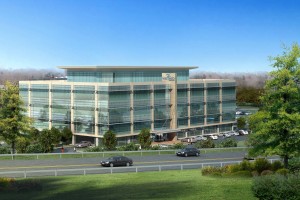Commercial office owner Mark Ellman made no bones about it at the recent BOMA State of the Market luncheon in White Plains: many of those Platinum Mile buildings that made Westchester a suburban office-park mecca for Fortune 500 companies in the 1970s have bad bones that won”™t carry them into the emerging new era in the county”™s real estate market.
And all the doctors in those large medical practices driving office leasing in the new market can”™t save them.
“A lot of those buildings are going to come down,” said Ellman, founding president and principal of Celestial Capital Group L.L.C., whose repositioned properties include 222 Bloomingdale Road in White Plains and the Saxon Woods Corporate Center in Harrison ”“ where the fast-growing Scarsdale Medical Group has leased 70,000 square feet of space and likely relieved the landlord”™s worst vacancy nightmares.

Ellman was referring to pioneer Westchester developer Lowell Schulman”™s portfolio of office- park buildings along the Interstate 287 corridor. “They weren”™t well-built 40 years ago,” he said.
“I think a lot of 287 should be demolished. I would love to see some high-rise residential go up for young Westchester natives who will have jobs here.” High-rise developments should be built with supporting retail and entertainment space, he said.
“The good buildings need to be repositioned. The bad buildings need to go away.”
“Just because it hasn”™t been done doesn”™t mean it won”™t work,” Ellman responded when BOMA panel moderator Al Gutierrez, executive managing director of Colliers International in Stamford, seemed wryly taken aback by his blunt proposal.
High-rise development on the 287 corridor “is years away,” Gutierrez said. But he and other brokers here agree that residential and medical uses for vacant and underleased office properties are the driving forces behind the market buzzword for 2014: “repurposing.”
On the Platinum Mile in Harrison, Avalon Bay Communities Inc. is said to have a pending deal to build 250 multifamily units on the site of 103 and 105 Corporate Park Drive, two Normandy Real Estate Partners properties that will be razed, broker Howard Greenberg said at another recent State of the Market panel hosted by the Westchester County Association Economic Development Task Force. The residential project would remove 165,000 square feet of “obsolete inventory” from the market, he said.
Greenberg also noted that RPW Group Inc., the Rye Brook-based real estate company headed by Robert P. Weisz, will propose multifamily housing on its former IBM office campus at 1133 Westchester Ave. in White Plains.
Al Mirin, executive director for investment sales at Cushman & Wakefield in Stamford, confirmed at the WCA task force meeting that a downtown White Plains office building, 440 Hamilton Ave., is under contract by an unnamed developer for repurposing as multifamily residential space.
Glenn Walsh, executive managing director at Newmark Knight Frank in Rye Brook, cited national statistics that indicate the country”™s over-65 population will grow by 35 percent over the next decade. That aging population will create a need for additional medical office space, a trend already playing out in Westchester County.

The average lease deal in the county for medical tenants used to be 2,000 to 5,000 square feet. “They don”™t want that space any more,” he told his WCA audience. As small medical practices join multispecialty practice groups such as Westmed Medical Group, space needs have risen tenfold.
“It”™s one-stop shopping. It”™s almost like a retail mall. The medical practices are doing it; the hospitals are going to be doing it,” Walsh said.
Small medical offices coming up for lease renewals are looking for one-year and two-year deals while they look to merge with larger practices, he said. “They are becoming dinosaurs and they”™re going away.”
Ellman at the BOMA luncheon offered this advice to owners leasing space to small medical offices: “I say, sell now. That”™s going away.”
Jim Fagan, senior managing director at Cushman & Wakefield”™s Westchester-Fairfield office, told the BOMA audience that several office building owners in Westchester are looking to sell aging properties that “need a lot of work. They don”™t want to be in Westchester.”
“I think for the next five or seven years, you”™re going to see the denominator of office space in Westchester County drop by about 10 percent,” he said. “People who put money into their assets will attract tenants and people who don”™t will have to do something else.”
That bodes well for the county market, Fagan said. “There”™s too much office space”¦.This is the place that”™s going to flourish. Surely we”™ve been taken a notch down by this most recent recession. But it”™s going to come back.”

Making a prediction for 2014, Fagan said there will be a lot of office buildings sold and a lot of refinancings in Westchester.
James Ritman, executive vice president and managing director at Newmark Knight Frank in Greenwich, predicted the county in 2014 will see a “flight to quality” in office space and amenities by tenants after five years when the stagnant market was dominated by lease renewals.
Then there”™s the de Blasio fear factor, which could chase corporate tenants and residents from Manhattan to Westchester.
“New York has never been as good as it is right now,” Ellman observed. But with Bill de Blasio taking office as mayor and winning election with a populist platform that included an income tax hike for the wealthy, people are talking of moving out of Manhattan, Ellman noted.
“It may be all sound and fury, signifying nothing,” he said. Then again, “It could be very good for Westchester.”




















